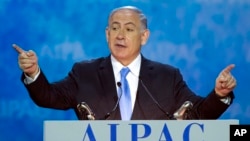The debate over the nuclear deal with Iran is dividing American Jews, who have traditionally aligned with the Democratic Party and supported Barack Obama in two elections — but not always when it comes down to Iran.
Four notable polls conducted since the deal was announced demonstrate that the American Jewish community is divided.
Figures also show a significant number of Jewish Americans are still undecided, along with the general U.S. population.
Polls: American Jews Divided on Iran Deal
- LA Jewish Journal: 49% of American Jews and 41% of all Americans support the deal. Opinions are divided on ideological and partisan lines
- J Street: 60% of American Jews favor of the deal along with 56% of the general American public
- Israel Project: 44% favor the deal. After being presented with a “two-sided/balanced discussion” on the pros and cons, that number decreases to only 30% (the Isreal Project opposes the deal)
- Quinnipiac University: poll of New Yorkers finds 33% of Jewish voters support the deal
Taking sides
“The split is more between the grassroots American Jews in general and what is called the ‘organizational’ Jewish community — Jewish organizations like The American Israel Public Affairs Committee (AIPAC), Anti-Defamation League, the American Jewish Committee, the Jewish Federations and some other organizations which have come out in opposition to the deal,” said Ori Nir, director of Communications for Americans for Peace Now.
AIPAC and its spin-off, Citizens for a Nuclear Free Iran, are spending between $20 million and $40 million against the bill; J-Street, the “pro-Israel and pro-peace” group that supports the deal, is planning on spending far less — about $5 million.
Thursday, more than two dozen prominent Jewish leaders — including a former AIPAC director — took out a full-page advertisement in the New York Times. While they expressed worry that Iran is “unflinchingly anti-Semitic and an unapologetic state-sponsor of terrorism,” they say endorse the nuclear deal and are calling on Congress to vote in its favor.
How to account for this divide?
“One factor in the polarization among American Jews is how Prime Minister Netanyahu and his ambassador, Ron Dermer, have inserted themselves directly in the debate,” said Ron Kampeas, chief for the Jewish Telegraphic Agency in Washington, D.C.
By his active campaigning against the nuclear deal, Kampeas believes Netanyahu has put himself into a position of opposing American Jewish voters’ “favored president.”
“More subtly, it's also sidelined the organizations that once saw it as their duty to defend Israel,” Kampeas said. “By directly supplanting these organizations, Netanyahu and Dermer have lowered their motivation to identify with Israel's cause.”
“The problem really is beyond venture politics,” said Israeli political insider Josef Olmert. “It’s about the Jewish community and its attitude towards Israel, and also about its role in the United States altogether.”
“The government of Mr. Netanyahu pulled no punches in the debate with the Administration, and the speech in Congress was a mistake… definitely with regard to the Jewish Community which is by and large more supportive of the Democratic Party than the Republican Party.”
Until recently, Olmert said, the Jewish community was the most supportive of all American ethnic groups of its “own country, of its historic homeland.”
And because the younger generation tends to be more liberal, he said, “they find it very difficult to support what they consider to be a right-wing conservative government in Israel.”
He believes that American Jewish voters — indeed, the U.S. public in general — has been caught up in an unfair public relations battle between Washington and the Netanyahu government.
“The public relations policies of the White House are extremely effective in hitting home on the heads of the Jews a point that many Jews don’t like to hear from their neighbors, let alone from the President,” Olmert said, “that is, the question of the presumed or alleged double loyalty, that is to say that if Jews support Israel at a time when Israel seems to be at odds with America, they show that their loyalty to Israel.”
Rabbi Steven Bob is one of 340 U.S. rabbis who sent a letter to Congress Monday, urging lawmakers to approve the deal.
“It’s not a question of conflicting loyalties. I would identify myself with the President of the United States. I’m a strong supporter of him. I worked hard for his election and I voted for him. And I would identify myself with those people in Israel who also support the agreement,” he said.
‘Fratricidal civil war’
Nir said the deal “is pulling at the very soul, the very essence of the American Jewish community and causing a great deal of pain, almost torture.”
Olmert referred to the rift as “a fratricidal civil war.”
“This is the big discussion in meetings, over the dinner table on Friday nights, in synagogues and in the pages of Jewish newspapers,” he said.
This week, the Reform Jewish Movement, which represents more than a third of American Jews, announced it will neither support nor oppose the Iran deal but focus, instead, on the future.




